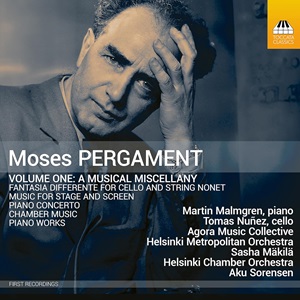
Moses Pergament (1893-1977)
Volume One: A Musical Miscellany
Martin Malmgren (piano)
Tomas Nuñez (cello)
Agora Music Collective
Helsinki Metropolitan Orchestra/Sasha Mäkilä
Helsinki Chamber Orchestra/Aku Sorensen
rec. 2021-24, Nya Paviljongen, Grankulla; Järvenpäätalo, Järvenpää; Organo, Music Centre, Helsinki, Finland
Toccata Classics TOCC0728 [76]
Moses Pergament came from a Lithuanian-Jewish family but was born in Helsinki. His real name was Parmet, but during his grandfather’s conscription for the Russian army it was changed to Pergament (‘parchment’ in English). He trained as a violinist in St Petersburg, but was never to study with Leopold Auer, as he might have hoped. Moving to Sweden in 1915 – he became a Swedish citizen in 1919 – largely to avoid conscription, he was befriended by Armas Järnefelt, studied conducting in Germany after the war, and then became a music critic in Stockholm. It was indicative of Pergament’s marginal place in Swedish musical life that when, in a 1929 article, Wilhelm Peterson-Berger called him ‘a foreign parasite’, Pargament went to Peterson-Berger’s house and slapped him in the face, which caused something of a sensation.
This miscellany seeks to restore Pergament’s name in premiere recordings of a variety of his music. Most of the pieces are small-scaled – brief solo piano works, works for solo cello – or derive from film and incidental music, but the disc opens with the biggest and strongest of them, the Piano Concerto of 1951-52. It lasts not far short of half an hour and is cast in three conventional movements, opening with some exotic, Eastern orchestral cadences, some quite slashing in effect. The piano writing is terse and brusque and the protagonist remains percussively brittle for much of the opening movement. The slow movement offers a serene elysian escape, an Arcadian grove of intimate beauty after the first movement’s pummelling, and contains some of the most beautiful writing to be heard on the disc. Though he ensures tension, even here, the limpid spell endures. The finale unleashes a Jewish dance, concerto grosso style, jocular and with a neoclassical feel. This is a most attractive work, strongly characterised and with a real sense of personality, and it’s played with authority by Martin Malmgren with the Helsinki Metropolitan Orchestra under Sasha Mäkilä.
The remainder of the disc progresses chronologically charting Pergament’s years in Russia onwards, from a soulful piano miniature written when he was 15, through three zesty Lyrical Dances that were composed between the ages of 19 to 22 that show the odd capricious turn of phrase. A richly sonorous Chanson triste, for the oddly effective combination of violin, violino obbligato, cello and piano, is lyrically powerful and enshrines a strong quotient of melancholy.
He was adept at incidental music, as he shows in The Feast of Esther where one detects a Mussorgskian strain (the two extracts last only five minutes) and equally useful in the film score for They Staked Their Lives, from which we hear three extracts, two of which have been transcribed by Malmgren for piano. The three piano pieces are salon-light and stylish. For several years from 1969 onwards he wrote works for the cello, possibly inspired by the Catalan cellist Gaspar Cassadó, who had died in 1966, and to whom Pergament had dedicated his Cello Concerto. The Meditation for solo cello is dirge-like and thoroughly gloomy whereas the earlier work of the same name, but written for cello and piano, contextualises its gloom in a rather more welcoming, athletic frame, not least in the scampering central section. Cellist Tomas Nuñez finds some rich colouration in its terpsichorean moments. Impressionist elements haunt the piano writing of the brief Melodica romantica for cello and piano. Pergament’s enthusiasm for sonority and instrumental conjunctions can be appreciated in the Fantasia differente for cello and string nonet, a strangely compelling piece that flows through expressionist and gently lyrical writing alike toward a rather ambiguous end – a meditation on the passing of time, or on death? Members of the Helsinki Chamber Orchestra under Aku Sorensen lend their support.
This is a splendidly realised project, and the inaugural volume of a Pargament series. The documentation is up to Toccata’s highest standards, and the performances are dedicated and assured. Malmgren is an especially valuable presence here, both for his stirring performance in the concerto and in the solo piano works and transcriptions. Tomas Nuñez distinguishes himself too. The recordings made in two different locations are excellent.
Jonathan Woolf
Buying this recording via a link below generates revenue for MWI and helps us keep free access to the site


Contents
Piano Concerto No 1 (1951-52)
Sorrow, Op 5 (1908-09)
Lyrical Dances for piano (1912-15)
Incidental Music for Kung Salomo (King Salomo): ‘Sulamith’s Dance’ for piano (1915)
Chanson triste, version for violin, violino obbligato, cello and piano (1915)
Incidental Music for The Feast of Esther: excerpts (1936)
Med livet som insats (‘They Staked their Lives’): Film Score (1939)
Festive Fanfare (transcr. composer) (1961)
For Nicole for piano (1974)
Meditation for cello (1974)
Meditation for cello and piano (1969)
Melodica romantica for cello and piano (1970)
Fantasia differente – ‘Cielo e térra’ for cello and string nonet (1969)

















